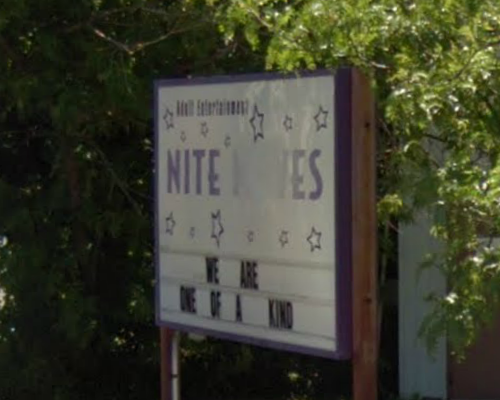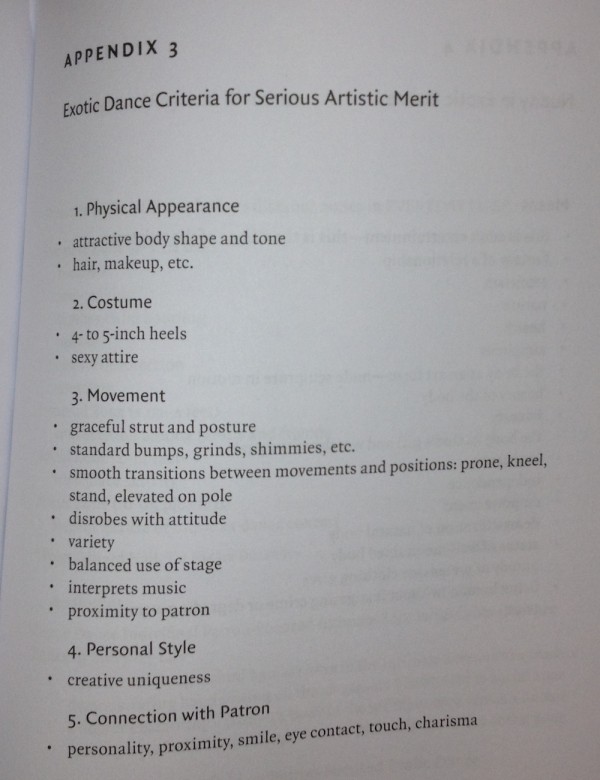
Albany strip club Nite Moves went before the New York Supreme Court today to appeal earlier rulings that the club owes taxes on money it has earned from cover charges and couch dance sales. Under New York tax laws, such charges are subject to taxes levied on places of amusement, like nightclubs, but the club claims they should be exempt as a theater of performing arts, like Broadway. Their main claim is that exotic dance is primarily art, and should be exempt as if it were ballet.
Oh, the hilarity! says one Village Voice blogger.
Under state law, “live dramatic or musical arts performances” like ballet have tax-exempt status. While lap dances are technically a “performance,” it’s a slightly less-refined form of dance than, say, any other form of “dance.”
Here’s how lap dances work: you pay a stripper roughly 25 bucks, depending on the strip club. She takes you to a dimly-lit backroom, puts you on a couch, pulls out her ta-tas and grinds her ass into your crotch for about 10 minutes. At its completion, you thank her, do your best to get the glitter and stripper stank off you, and hope your wife doesn’t find out. There is nothing artistic about it.
Sounds like someone’s been shot down by a stripper! Sorry about your boner, buddy. Gothamist has slightly more compassion:
We’d humbly suggest to the court that attempting to gyrate when the jukebox breaks and plays Sussudio for the third time and most of the patrons are on their fifth Diet Pepsi is not merely training, but baptism in the fire of combat.
That’s more like it. Especially if your customer is as misinformed as that Voice writer and thinks a $25 lap dance is supposed to last for ten minutes.
 There’s a lot in play in this case, and contesting the idea that stripping is art might turn out to be the least significant element. Contrary to that Voice post, it’s pretty well-established that exotic dance is, in fact, an art form. There are certain criteria for its performance, there are choreographed moves, there are standards that it meets. Anthropologist and dance scholar Judith Lynne Hanna, who has served as an expert witness in many cases like these, lists its moves in her recent book, Naked Truth. See that list to the left? And this pole dancing glossary? If anyone who thinks exotic dance isn’t art or isn’t choreographed can perform these without practice, I might consider not laughing at them. Lapdancing might be a performance that crosses over into sex work, sure, but it still has its own expressive goals. Even if that goal is giving a customer a boner. Doesn’t make it Not Art.
There’s a lot in play in this case, and contesting the idea that stripping is art might turn out to be the least significant element. Contrary to that Voice post, it’s pretty well-established that exotic dance is, in fact, an art form. There are certain criteria for its performance, there are choreographed moves, there are standards that it meets. Anthropologist and dance scholar Judith Lynne Hanna, who has served as an expert witness in many cases like these, lists its moves in her recent book, Naked Truth. See that list to the left? And this pole dancing glossary? If anyone who thinks exotic dance isn’t art or isn’t choreographed can perform these without practice, I might consider not laughing at them. Lapdancing might be a performance that crosses over into sex work, sure, but it still has its own expressive goals. Even if that goal is giving a customer a boner. Doesn’t make it Not Art.
Strip clubs are in business because of the naked dancing women. That’s their primary function. They are also in the business of selling alcohol (sometimes; not in the case of this club) and champange rooms, but, just like people don’t go to Radio City for the concessions, people don’t go to strip clubs just to drink Pepsi. The dominant percentage of their business comes from patrons entering the establishment to enjoy the performances.
If New York is going to allow for an exemption for something as subjective as artistic performances, they have to expect challenges like this from strip clubs, and, perhaps, other amusements that are artistic in nature. In 2006, New York jazz clubs were granted an exemption from this amusement admission tax when then-Gov Pataki signed Senate Bill 06972 into law. The bill put jazz clubs into the “art” category, and jazz is frequently all about making shit up on the fly in dark rooms. It’s called improvisation.
Clearly Nite Moves is trying to get out of paying taxes on cover charges and the cut it takes from dancers on private dance fees. For their part, the dancers are already liable for income taxes on their portion of the dance price. If anyone deserves the tax break for producing art, it’s the performing artists themselves. But to argue that their performances aren’t art is an argument on par with “my three-year-old could draw that.”
Yeah, that blogger clearly has bitterness out his eyeballs and fingertips. I wonder how many nakie ladies have cleaned out his wallet? I bet at least a couple.
James King seems to have more than immaturity and insecurity issues based in being aroused by a dancer, then not having his sexual desires satisfied immediately. His words have the smugly superior tone of one who not only does not approve, but knows he’s ‘right’ and that those who don’t agree with his view are deficient and inferior. In short, he sounds like an an asshole. I’d be willing to bet that the ‘sounds like’ translates to ‘is.’ The ‘give me a friggin’ break’ option for the ‘poll’ tends to support my opinion.
Taxing a lap dance is a bit silly. But not because it’s an art form. Say this to yourself seriously: Cock grinding is an art form; a hand job is artistic expression. Stupid, right?
The government’s problem is trying to tax dancers. That’s what this is all about. And the problem with that lies in the current nature of the business. To properly tax dancers, clubs would have to return to treating dancers as paid employees (which, given stage requirements, they essentially are). This in turn would cause a problem with the dancers’ lap dance commissions. Clubs would lose their house fee income from the girls; they would also have to go back to paying DJs and house moms. To compensate, clubs would need to take a higher percentage of dancers’ room sales. In turn, dancers would make less money and the workforce would be greatly diminished, leading to diminished clientele and many businesses closing – tax-paying businesses, I might add.
Governments, both local and state, need to back off and continue to hit the rich club owners in their big, deep pockets – not the dancers. They are at the bottom of the pyramid.